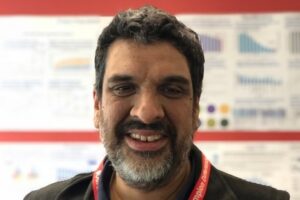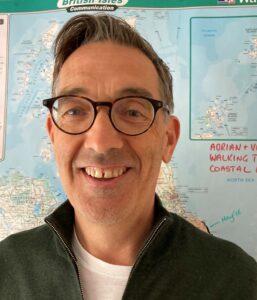Analysis in Government Month: Senior leader Q&A
This Analysis in Government Month we have an exclusive insight into the minds of our senior leaders. We quizzed a selection of Departmental Directors of Analysis about:
- the things that matter to them
- what they’re most proud of
- the best career advice they have had
But we also delved into some of the issues that really matter to all of us, like what sort of music do they like, what’s their favourite film, and scones: jam or cream first?!
You may remember we ran a Twitter poll back in April and the most popular question you wanted us to ask was: Who inspires you and why?
We then asked all respondents to choose from a list of questions, which has given us a great insight into exactly what makes our senior leaders tick…
Osama Rahman, Chief Analyst and Chief Scientific Adviser, Department for Education

Your inspiration
My team!!!! Because their brilliance and dedication is the biggest driver of making me want to come in (in-person and virtually) to work every day!
Career questions
Question (Q): What’s been the best piece of advice someone has given you?
Always be true to yourself.
Q:What’s the highlight of your career so far?
Working with others to set up the Government Economic Service Applied Economics Degree Apprenticeship scheme.
About you
Q: Favourite song or band?
My joint favourites are The Clash and Ustad Nusrat Fateh Ali Khan.
Q: Favourite book or film?
Star Wars. And I refuse to call it “Star Wars: A New Hope (Episode IV)”!
Liz McKeown, Director of Public Policy Analysis, Office for National Statistics (ONS)

Your inspiration
I’m inspired by the fantastic teams we have here in ONS. They work tirelessly to produce the statistics and insights the country needs. This was particularly demonstrated during the coronavirus (COVID-19) pandemic when new surveys were set up in days, new sources were deployed for the first time and new influential insights were produced to provide both policy makers and the public with the information they needed.
Career questions
Q: What’s been the best piece of advice someone has given you?
You miss 100% of the shots you don’t take.
Q: How would you like to see collaboration happening across the Analysis Function (AF)?
I’d like to see it happening across departments, across disciplines and at every level. The policy challenges we are facing today require us more than ever to come together across boundaries to provide the best possible evidence base. I think the AF has a key role to play in facilitating that.
About you
Q: What was your first job?
My first job was working in Tesco.
Q: Do you prefer coffee or tea?
Always coffee in the morning, often tea in the afternoon.
Dr Laura Gilbert, Chief Analyst, Director of Data Science at 10 Downing Street

Your inspiration
My inspiration is Emily Lawson. She is incredibly impressive personally and professionally. The things I admire most are her bravery, excellent strategic mind, and unwavering adherence to her principles. She brings much needed boldness and candour into the field, making this a more exciting and inspiring place to work.
Career questions
Q: What’s been the best piece of advice someone has given you?
Alex Chisholm told me that to succeed and make change in the civil service you need “relentless optimism”. It’s really resonated and become my motto. I simply refuse to believe that I cannot drive the transformation I think that we need, and I act accordingly. So far it has worked really well for me!
Q: What’s the highlight of your career so far?
Very hard to choose, I have had a very interesting time. I think the most professional satisfaction I have had was when I built a novel algorithm to figure out whether people had unusual heart rhythms of various sorts with under around 30 seconds of real-time data from their thumbs. It would pick up each heartbeat with an accuracy that matched cardiologists for clean traces, and out-performed them for very noisy traces. I built it into an app that showed the user their heart beating in a live visualisation with only a few milliseconds of lag. It was CE marked.
About you
Q: What was your first job?
My first real job was as an analyst in defence intelligence. My first paid job was as a janitor. Having filled all the urinals with bleach, I had to call my then boyfriend up and ask how you flush a urinal. (Answer for the ladies: you don’t, you just sort of throw a tablet in there and it self flushes at intervals apparently. This was not a professional highlight.)
Q: Dream holiday destination?
My dream holiday destination is Langkawi. I have been once, after my father died, he had told me it was the best place in the world to visit. I dream of going back for a longer visit. They have five different types of flying animal, other than birds. They have flying snakes, flying frogs, flying fish, flying squirrels, and colugo, or “flying lemurs”. That’s my kind of place.
James Benford, Director of Analysis, His Majesty’s Treasury
Your inspiration
I think you’d get a different answer on this one from me each time you ask. Today I am thinking of Thom Waite, who was recently made permanent as Deputy Chief Medical Officer. I worked with Thom during the set-up phase of the Joint Biosecurity Centre (JBC). It was a really high-pressure time as the organisation had been declared open for business in the midst of the pandemic whilst we were still trying to (figure out how to) build it.
Thom always found it within him to remain calm, generous with his time, and patient with those who knew less than him about what was going on, which was pretty much everyone at JBC back then. Of course, he also provided great clarity of thought and exposition, but it’s the way he treats others and conducts himself that I admire the most. I hope somehow this reaches him, because he’d be embarrassed to read it.
Career questions
Q: What quote really resonates with you?
Not all those who wander are lost. For me, the critical ingredient for analysis is curiosity as much as ingenuity. It’s important to ask why things are done a certain way and be willing to explore another. It’s also important to stop to explore a quirk in the data that doesn’t fit a prior piece of data or fit with what other sources are saying. Often you do need to go off in a different direction to find a new insight. To mix two further aspects that might have been relevant for the next section, you’ll have gathered from reading this that I like getting lost in the countryside and found time in my childhood to read Tolkien.
Q: How would you like to see collaboration happening across the AF?
Sometimes it can be hard to find the space and overcome all the obstacles required to effectively collaborate on analytical work across teams and across departments. Particularly now that we have the Integrated Data Service (IDS) starting up, it would be great to see if we could use the function to identify some priority questions to answer over a six-month horizon and leverage our new platforms to bring together some cross department teams to find the answers. I’ve slightly stolen this thought from Jane Whitaker at Knowledge, Analysis and Intelligence, HM Revenue and Customs who alighted on the importance of priority questions to make the most of the IDS.
About you
Q: What was your first job?
I worked in a greengrocers and florist when I was 16. Two memories stand out. The first is Christmas, which involved 6am starts and moving frozen Christmas trees from out the back to the front of the shop. The second is tulips, and being tasked with unboxing a fresh delivery and putting them out in buckets of water on display. A fairly simple task, though knowing little about flowers, I put all the tulips in the buckets upside-down. My boss was not so impressed. Stupid questions really are worth asking.
Q: What is your dream holiday destination?
A long distance walking trail in the mountains. Preferably one that includes some scrambling, involves a border crossing somewhere, allows for camping but has the odd refuge, and has bad mobile phone signal. I’m in the market for suggestions from those in the know.
Adrian Richards, Joint Director of Knowledge, Analysis and Intelligence, HM Revenue and Customs

Your inspiration
I regularly find inspiration from in my team. A recent example is Toby Heyward-Butcher in Ministry of Justice, who turned an idea and some backing I had into an impressive shared-outcomes fund bid to use joined up data to find solutions to problems for vulnerable people across social policy. He is now leading work to turn this into tests to learn from.
Career questions
Q: What’s been the best piece of advice someone has given you?
No one knows what we do, tell them what good looks like and how you will deliver it. Donna Ward told me this before my Director interview.
A coach also told me that I am the source of most of my emails, which makes you think about initiating or responding to email.
Q: How would you like to see collaboration happening across the AF?
I would like to see collaboration be less of a collection of professions and more a collection of differing skills that add up to a coherent toolkit that has impact. We need to help our colleagues understand our capability and look to join up more on capability, people and our underlying tools, such as data.
About you
Q: What was your first job?
I worked as a barperson in a working men’s club.
Q: What is your dream holiday destination?
South Africa.
Glyn Jones, Director of Analysis, Welsh Government

Your inspiration
I can bore anybody to sleep about my football team Leicester City’s Premier League win of 2016, so I’ll draw on that again here. As an analytical leader in Wales, we have always sought to punch above our weight and do amazing things by pulling together as a team and working for each other, no matter what profession or speciality. That Leicester City team proved anyone can achieve great things by doing just that, and it was the most inspiring sporting moment that ever was, or ever will be.
Career questions
Q: What’s the highlight of your career so far?
I’ve been very lucky to work with some amazing teams over the years, so it does feel hard to pick one highlight. I’d say the things I look back on with pride are those where you can truly feel you have made a difference to people’s lives, in particular where they have involved pulling teams together to solve a particular problem.
A few years ago, we launched and won awards for the MyLocalSchool website, a collaboration across statisticians and digital teams giving parents access to data about schools in their area. We built this entirely with the focus of helping parents getting better informed and the feedback we got really made us feel we had made a difference.
Or more recently where our data experts worked with local authorities to give them high quality data on the shielded population to ensure the most vulnerable people were getting the support they needed during the pandemic. And our geospatial team have built upon this in recent months, using our DataMapWales platform to ensure front line services are swiftly getting access to the data they need to save lives during floods and other emergencies. That makes the hard work feel incredibly worthwhile.
Q: How would you like to see collaboration happening across the AF?
I want to see collaboration across the different professions and across different organisations being natural for all of us. It should not be the exception. At the end of the day we all have the same objective: to improve people’s lives. So collaboration should about how best we collectively achieve our end goal.
Where there is a policy question which needs evidence, let’s bring together statisticians, economists, researchers, geographers, data scientists, and find the best way of answering that question whatever the approach or discipline. And when we’re working across organisational boundaries, let’s not ask why we should share data with each other, but how we can do that in the most efficient and effective way which helps ensure decisions are based on the best evidence in order we are improving people’s lives.
About you
Q: What is your favourite song or band?
R.E.M. (and Man on the Moon)
Q: Do you put jam or cream on your scones first?
I holiday in Cornwall every year. It’s jam first. Every time. And plain scones please.
Ian Knowles, Deputy Director, Data, Insight and People Analytics Division, Department for Transport
Your inspiration
Lewis Hamilton. Despite being hugely successful and rich beyond words, he still finds time to dedicate to a number of causes, including diversity in sport. He pushes himself ever harder at his profession and put up with an enormous amount of rubbish written about him. A true champion and inspiration.
Career questions
Q: What’s been the best piece of advice someone has given you?
When I was struggling as a new Senior Civil Servant in a new department, my old boss met me for coffee, listened to me talk, and suggested I just give it two to three more months. He said that if it didn’t work out, he would take me back. This was just what I needed, it all started to click soon after that, and I was back to my confident and professional self.
Q: What’s the highlight of your career so far?
Seeing the Prime Minister open the COVID-19 briefings with the slide on transport data which was the culmination of so many people’s innovative and hard work to switch to producing near real time data.
About you
Q: What was your first job?
My first job was a front office role helping jobseekers find opportunities for work. This was a temporary role after I left university. I’m really glad I did this to get a glimpse of the significant difference between a head office type role, and a delivery role.
Q: What is your favourite book or film?
The Wheel of Time by Robert Jordan.
Jenny Dibden, Director, Funding Delivery Directorate Cities and Local Growth Unit, Department for Levelling Up, Housing and Communities
Your inspiration
Nelson Mandela. The reasons for this are obvious, but they include his calmness in the face of everything, combined with his ferocious tenacity to see change.
Career questions
Q: What’s the highlight of your career so far?
Being Senior Research Officer for the Covid-19 business grants.
Q: What quote really resonates with you?
In with the stress, out with the love.
About you
Q: What was your first job?
My first job was a paper round delivering the Bournemouth Evening Echo in rural Dorset. My first Civil Service job was as a casual Social Science Research Officer Employment Department.
Q: Do you prefer coffee or tea?
A pot of tea made with tea leaves and left to brew a decent amount of time. Not too much milk.
Tom Aldred, Director, Government Economic and Social Research team, His Majesty’s Treasury
Your inspiration
I am a governor at a school in Tottenham and am inspired by the commitment, dedication and innovation of the staff, in particular the Head Teacher. Particularly in the last two years, they have been single-minded in putting the needs of children first, in the midst of incredibly challenging circumstances. He’s also taught me a lot about the importance of values in bringing people together and inspiring them to do their best.
Career questions
Q: What’s been the best piece of advice someone has given you?
Somewhere I picked up the advice that in a situation of uncertainty, approach your next move like a chess player. Strengthen your position and increase your options. I’ve used this many times both in policy work and in planning my career.
Q: What quote really resonates with you?
“We should not try to design a better world – we should make better feedback loops” – Tim Harford, ‘Adapt’. 19 years in government has helped me to realise that, however smart we think we are; our brilliant ideas don’t always work. We need to be able to spot that and to adjust accordingly.
About you
Q: What was your first job?
I spent an enjoyable nine months as an admin assistant at Wisden, the publishers of a cricket magazine and annual. The shift to online journalism has upended the industry and made it very hard for even talented writers to sustain a fulfilling career. Comparing how rewards have changed in that sector compared to, say, banking, has convinced me of the importance of luck in our success.
Q: Would you prefer to bake a cake or buy a cake?
I chose to switch to a vegan diet a few years ago and enjoy trying to recreate cakes without recourse to eggs, butter or milk. The explosion in the variety of vegan cakes available is a testament to the power of competition in driving innovation, but I still prefer my own creations, probably due to in-built behavioural biases!
Visit our Analysis in Government Month hub page if you’re interested in finding out more about this year’s event.
